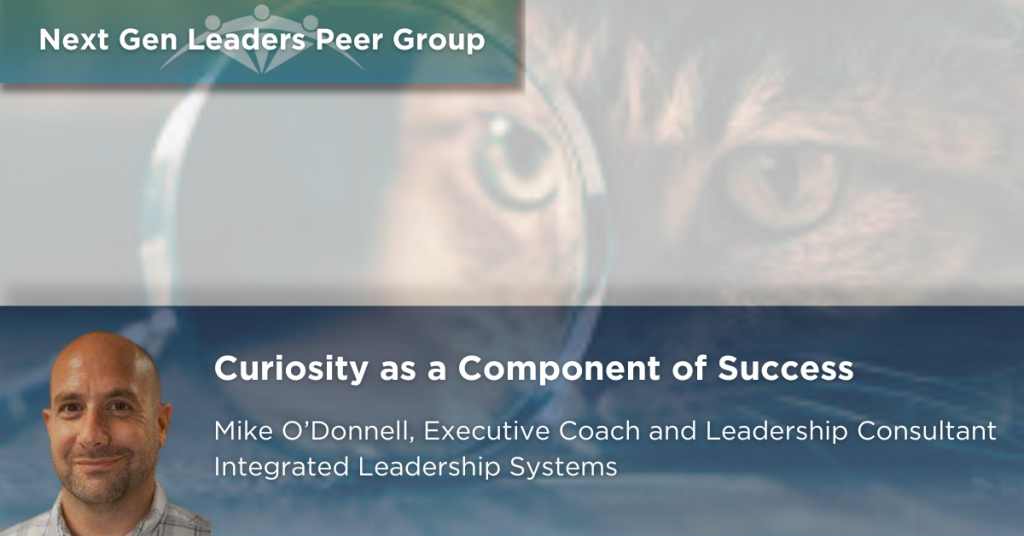So often we focus on trying to avoid the difficulties, obstacles, frustrations, and unwanted emotions that come our way. In our work as consultants, we call these “headaches.”
But what if, instead, we could gain something more from these “headaches” and discover a path to greater fulfillment and growth?
This was the focus of our most recent Next Gen Leaders Peer Group at the Conway Center for Family Business, and we centered our time on a secret formula for success:
Curiosity.
Our culture doesn’t often value curiosity. In fact, when the question came up in our Next Gen group – “What do you think of when you think of curiosity?” – the answer was that it killed the cat. The lesson we are taught there is that it’s far too dangerous to get curious.
It's become a cliché to downplay the importance of curiosity. We are often expected to follow the status quo, to stick with rote ways of doing things, and that can be especially true in a family business. While we value the safety of doing things a certain way, we also value expertise so much that we dare not say “I don’t know,” not even for the sake of discovering together. Curiosity simply carries too much risk.
What we don’t realize is that there is tremendous risk either way. It’s very risky for me to accept the status quo. There’s risk involved in staying stagnant, in not pursuing growth opportunities. There is risk in not doing the work of paying attention to my reactive tendencies, as much as there is risk in learning from those tendencies and seeking a better way. As Bill Adams said, “There is no safe way to be great. There is no great way to be safe.”
In order to find a better way we need to get curious, and getting curious involves learning how to ask different questions.
When things don’t go the way we hope, or plan for, we often find ourselves asking “why.” Getting curious means that instead of asking “why” we would be better served by asking different types of questions. Our peers in Next Gen Leaders spent some time revisiting a situation that didn’t go as we had hoped. We started to examine our reactions to factors in that situation, and then we asked ourselves, and each other, some different questions.
-What were my reactions?
-Where was I carrying that tension?
-Who else do I know who might react in the same ways?
-What emotions were behind my reaction?
-How were my underlying beliefs fueling the emotions I was feeling in that scenario?
In a family business, it’s very important to examine our reactions to the things that occur. We may find that we are trying to live up to an expectation that in reality may not be in place. We may discover that we are reacting in the ways we’ve seen our predecessors react. It could be that we are reacting to something else going on in our lives and that we are merely filtering our experiences through that other burden we are currently carrying. Whatever the case may be, curiosity helps us to unpack these things so that we might gain a greater sense of self-awareness, increase our emotional intelligence, and learn to move toward creative leadership for our family business and away from our reactive tendencies that continue to block our growth and success.
We discovered what happens in the brain when we choose to be curious, also what happens when we are reactive. When we are reactive, our amygdala is activated. That’s the part of our brain that moves us into “fight or flight.” We experience anxiety and unpleasant emotions because our body is ready to react to protect ourselves. Stress hormones are deposited into our bloodstream, and we begin to shut down in key places to focus on the perceived threat.
Contrast that with curiosity. First, our reward circuitry is engaged. This releases dopamine, one of the “feel good” chemicals. Our hippocampus opens up to look for connections to emotion and memory and prepares to form new memories around the experience. This also makes us aware of being vulnerable, because the part that opens us to curiosity also looks at all the known possibilities. In other words, our brain is excited and also keenly aware of risk. This is one main reason why we may shy away from being curious: the risk may seem too great.
To summarize:
Reactivity puts us in “fight or flight,” we see situations as threats, we are flooded with stress hormones and closed off to possibilities.
Curiosity opens us to possibilities, rewards our brain with dopamine, prepares us for excitement, and allows us to be aware of being vulnerable so that we can make better informed decisions.
Our brains form patterns based on survival and the more we engage with patterns of reactivity the more our brains build the habit of moving toward the “fight or flight” response.
Curiosity can break that pattern.
When we can begin to approach the difficulties, obstacles, frustrations, and unwanted emotions that come our way with curiosity we can move even closer to the success we’ve defined for ourselves and for our family business. Curiosity allows us to learn more about ourselves and the underlying beliefs that fuel our reactions. By asking different questions about those reactions, we can change those that are unwanted and reorder our decisions toward the fulfillment and successes that we truly want to pursue.
Mike O’Donnell
Executive Coach
Leadership Consultant
Integrated Leadership Systems


